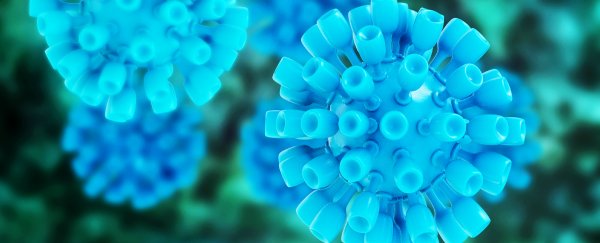The human papillomavirus (HPV) is pretty nasty - not only can it trigger genital warts, but if it's not controlled by the immune system, researchers have found that it can also lead to a range of cancers.
Most famously, various strains of the virus are involved in more than 99 percent of cervical cancer cases. But scientists have recently found that HPV can also trigger anal and oral cancer, and although current campaigns are targeted to young women, both males and females could benefit from being protected.
There are already two effective vaccines on the market, Gardasil, which protects against four strains of the virus, and Cervarix, which protects against two. But new research published in the New England Journal of Medicine has revealed that a new vaccine, Gardasil-9, can protect against, you guessed it, nine strains of the virus.
A randomised, double-blind clinical trial of 14,215 women aged between 16 and 26 found that Gardasil-9 can protect against five additional strains when compared to Gardasil - HPV-6, 11, 16, 18, 31, 33, 45, 52 and 58.
This means that the new vaccine could in theory prevent 90 percent of cervical cancers, compared to the 70 percent Gardasil currently stops. Overall there are 14 strains of HPV associated with cervical cancer (out of 100 known strains), so being able to protect against more than half of them is a big step forward.
As Cathleen O'Grady reports for Ars Technica, the new vaccine was also associated with more side effects than the current options, but they weren't severe:
"In the Gardasil-9 trial, the nine-valent vaccine was associated with more side effects, but the effects were not comparably dangerous to the kinds of cancers prevented by the vaccine. The slightly higher rate was to be expected, the researchers note, because the new vaccine has more virus-like antigens. The most common effects included swelling and pain at the injection site, and some patients experienced headaches, nausea, dizziness, and fatigue."
Despite these side effects, it's hoped that the new uptake will be encouraged in both males and females - something that's important given how common the virus is.
"The female-only campaigns leave men who have sex with men unprotected," lead author of the paper Elmar Joura, from the Medical University of Vienna in Austria, told O'Grady.
At any given time, one quarter of Americans have HPV, and it's estimated that almost all sexually active people will be infected at some point in their life. And if these infections aren't cleared up by our immune systems, they can lead to cancers.
The researchers are also hoping that the new vaccine may help increase the uptake of the vaccine, which in the US in particular is low, with only 33.4 percent of girls having completed the course of three HPV vaccines, compared to 60.4 percent in the UK and 71.2 percent in Australia.
While a vaccine that protects against only some types of cancer may not be as headline-worthy as a new treatment or a cure, it's incredible that we have a quick and easy way to protect ourselves against a whole range of cancers. And even more incredible that not everyone who is able to use it chooses to do so.
Source: Ars Technica
